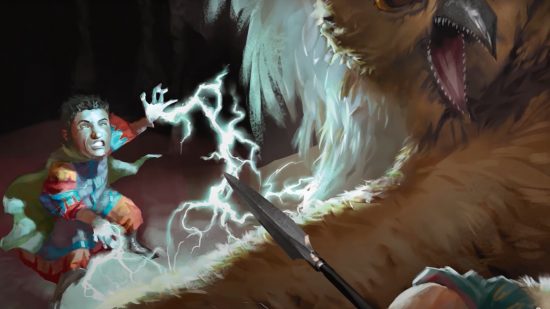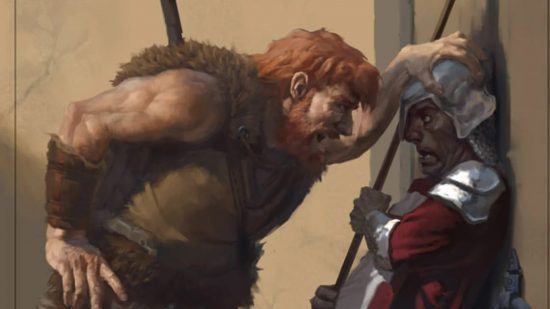The DnD Restrained condition can get Dungeons and Dragons players tied up in knots. There are a variety of ways you may become Restrained, and it might not be immediately obvious what that means – or how you can get out of it.
Characters of all DnD classes and DnD races can fall prey to the Restrained condition. Dungeon Masters can also fall prey to forgetting exactly how the condition works. We’re here to help you grasp the slippery subject – read on for a definition of Restrained 5e, as well as how to cause and counteract it.
What is Restrained 5e
In roleplaying terms, a creature is restrained when something (a net or a spell, for example) holds it in place. In rules terms, the Player’s Handbook says a Restrained creature gains the following:
- Its speed becomes 0, and no bonuses can increase its speed.
- Attack rolls against it have advantage, and the creature’s attacks have disadvantage.
- The creature also has advantage on Dexterity saving throws.
How to Restrain in DnD
There are a variety of ways your character can restrain an enemy in Dungeons and Dragons. These include:
Spells
Many 5e spells will restrain their target. Here are all the spells that can cause the Restrained 5e condition:
| Spell name | Level | Class |
| Ensnaring Strike | 1 | Ranger |
| Entangle | 1 | Druid |
| Snare | 1 | Druid, Ranger, Wizard, Artificer |
| Maximillian’s Earthen Grasp | 2 | Sorcerer, Wizard |
| Web | 2 | Sorcerer, Wizard, Artificer |
| Evard’s Black Tentacles | 4 | Wizard |
| Watery Sphere | 4 | Druid, Sorcerer, Wizard |
| Telekinesis | 5 | Sorcerer, Wizard |
| Transmute to Rock | 5 | Druid, Wizard, Artificer |
| Wrath of Nature | 5 | Druid, Ranger |
| Bones of the Earth | 6 | Druid |
| Flesh to Stone | 6 | Warlock, Wizard |
| Mental Prison | 6 | Sorcerer, Warlock, Wizard |
| Prismatic Spray | 7 | Sorcerer, Wizard |
| Whirlwind | 7 | Druid, Sorcerer, Wizard |
| Imprisonment | 9 | Warlock, Wizard |
| Prismatic Wall | 9 | Wizard |
| Ravenous Void | 9 | Wizard (Graviturgy Magic) |
Magic items
A simple net or length of rope can be used to restrain someone, but there’s also a range of DnD magic items that get the job done. These include:
- Rope of Entanglement – Sentient rope with an armor class of 20 that’ll restrain a foe when you speak the command.
- Wand of Viscid Globs – Spend a charge to restrain an enemy with a glob of viscous material (eww).
- Iron Bands of Binding – Command or throw this rusty metal sphere, and a tangle of metal bands will restrain your opponent.
- Blade of the Medusa – a DnD weapon that restrains creatures it hits as well as dealing damage.
Feats
There is one 5e feat that’ll allow you to Restrain with ease. As long as your Strength DnD stat is 13 or higher, you can take the Grappler feat, which allows you to pin a creature you’ve used grapple 5e on. On a second successful grapple check, you and the creature are both restrained.
How to escape being Restrained
If you’re Restrained by a spell, you may need to succeed on a saving throw to escape the condition. The spell may also require concentration of the caster, so you can end the Restrained condition by breaking that.
Remember, you can still attack while Restrained (even if you do have disadvantage). One lucky hit might be enough to break your captor’s concentration or put them out of action. Then – boom – Restraint over.
Spellcasters like DnD Wizards, DnD Warlocks, and DnD Sorcerers may also be able to use magic to escape their binds. If a DnD monster has its tentacles (or claws, or jaws) on you, a spell like Thunderwave can push them away.
Failing that, teleport. If you’re not a high enough level to cast the actual Teleport spell, a simple Misty Step can get you out of Restraining range.
As well as reacting to the Restrained condition, you can take some steps to prevent it. For example, casting Freedom of Movement or wearing the Ring of Free Action make it much harder to pin you down.
Looking for more D&D rules clarifications? Here’s how fall damage 5e works, as well as how to use a DnD short and long rest.



